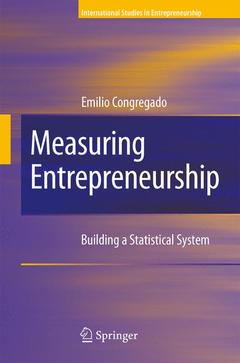Description
Measuring Entrepreneurship, Softcover reprint of hardcover 1st ed. 2008
Building a Statistical System
International Studies in Entrepreneurship Series, Vol. 16
Coordinator: Congregado Emilio
Language: English
Subjects for Measuring Entrepreneurship:
Measuring entrepreneurship: building a statistical system (paperback) previously published in hardcover (series: international studies in
Publication date: 11-2010
338 p. · 15.5x23.5 cm · Paperback
Publication date: 11-2010
338 p. · 15.5x23.5 cm · Paperback
Measuring entrepreneurship: building a statistical system
Publication date: 10-2007
338 p. · 15.6x23.5 cm · Hardback
Publication date: 10-2007
338 p. · 15.6x23.5 cm · Hardback
Description
/li>Contents
/li>
Entrepreneurship is playing an increasingly important role in the political agenda. Thisphenomenonis dueto theincreasingin?uenceofpolitics ontheentrepreneurial promotion of growth and employment objectives. This results in the need to satisfy the new demand for statistical information in two ways. On the one hand, quanti- tive information -stock and ?ow analysis, on the other hand, qualitative information ?which tries to assess the ability to create wealth and employment and to innovate and export, among others. Consequently, searching a systematic set of indicators that allows us to understand the basic entrepreneurshipdimensions in order to di- nose, forecast,andmonitorentrepreneurialnetworks,is crucial forboththe research agenda and the political action agenda. However, the lack of this kind of statistical information is clear if we review some statistical subsystems on entrepreneurship on a comparison basis. The few essays on the subject are still in an initial stage. The reference theoretical framework to set the key dimensions to be analysed is to be established yet. The search for indicators and even the articulation of speci?c statistics have become crucial in order to make progressin the applied research, and to design, implement, and assess the different measurements of public intervention on this subject. Thus, the developmentof a set of indicatorsthat allow us to satisf- torily capture the different dimensions of the entrepreneurial network for a speci?c sector or territory becomes a basic element to assist progress in entrepreneurship knowledge.
and Outline.- and Outline.- The Current State: Entrepreneurship in Theory and Practice.- Statistical Issues in Applied Entrepreneurship Research: Data, Methods and Challenges.- Entrepreneurial Tools.- Measurement: Dimensions, Indicators and Statistical Sources.- Understanding Entrepreneurship: Developing Indicators for International Comparisons and Assessments.- The COMPENDIA Data Base: COMParative ENtrepreneurship Data for International Analysis.- Entrepreneurship Analysis from a Human Population Surveys’ Perspective.- A Proposed Framework for Business Demography Statistics.- Entrepreneurship Performance and Framework Conditions: A General Framework.- The Current Applied Research on Entrepreneurship.- Self-Employment and Unemployment in Spanish Regions in the Period 1979–2001.- Tax Incentives and Entrepreneurship: Measurement and Data Considerations.- Using Survival Models with Individual Data.- Entrepreneurial Human Capital: Essays of Measurement and Empirical Evidence.- Global Entrepreneurship Monitor and Entrepreneurs’ Export Orientation.- Labour Market Institutions and Entrepreneurship.- Financial System and Entrepreneurship: Institutions and Agents.- Building a Statistical System on Entrepreneurship: a Theoretical Framework.
© 2024 LAVOISIER S.A.S.




